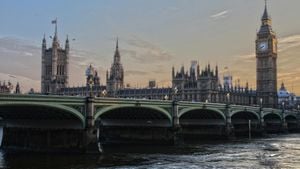BAKU, Azerbaijan, November 23, 2024 — The 29th UN Climate Conference (COP29) concluded today with what some are describing as insufficient progress. A newly established climate finance goal of $300 billion emerged, but experts and climate advocates assert this figure falls woefully short of the urgent needs of developing countries.
During the conference, developing nations were unified, calling for at least $1.3 trillion per year. They emphasized the need for substantial investments to mitigate climate impacts, adapt to current changes, and address loss and damage from climate-related disasters. The stark statistics reveal the cruel reality: rich nations, which historically contributed the bulk of greenhouse gases, are still considered responsible for supporting global climate efforts but continue to hesitate on financial commitments.
Nikki Reisch, director of the Climate & Energy Program at the Center for International Environmental Law (CIEL), did not hold back on her critique, labeling COP29 as "a dumpster fire." She remarked, "Except it’s not trash that's burning—it's our planet." Reisch elaborated on how developed countries seem to prioritize fossil fuel interests over meaningful climate commitments, stressing, "Their refusal to pay up for climate action puts the Global South at risk." This point was underscored by numerous delegates from the Global South, who bemoaned the negotiations' failure to deliver sufficient accountability measures.
The conference referenced the dire state of climate finance across several fronts. Reisch called out the hypocrisy of wealthy nations who present themselves as leaders on climate action yet regularly miss their legal obligations to deliver adequate financial support. With funding gaps, uncertain contributions from countries like China, and loopholes for fossil fuel projects, climate activists were left frustrated.
Another key player at COP29 was Wopke Hoekstra, the European Commissioner for Climate Action, who pushed for ambitious efforts from the EU. He described the new finance goal as "ambitious and realistic" but acknowledged the inherent gaps. Hoekstra stated, "We’re not overpromising large funds, but we aim to deliver for those most vulnerable." Germany’s Foreign Minister, Annalena Baerbock, echoed the sentiment, declaring, "This is precisely the approach we need, rather than empty promises." Yet, critics like Rob Moore from the clean-energy think tank E3G argued this approach falls “dangerously short” of meeting actual financial needs.
Interestingly, as discussions unfolded, conditions triggered considerable criticism concerning human rights. It was noted by several NGOs, including CIEL, how COP29 fell short of safeguarding human rights amid climate action frameworks. Delegates were alarmed with accusations of backsliding on these issues, mentioning Azerbaijan's own record of civic repression. The host country’s distinct approach to dissent demanded vigilance around climate negotiations where civil rights were being eroded.
"The climate emergency demands bold action fueled by public participation and accountability, yet COP29 fell far short of both these standards," noted Sébastien Duyck, CIEL’s Senior Attorney. He proceeded to highlight the failures of the conference to materialize necessary commitments for human and environmental rights.
Despite the stirring calls for change, concerns lingered as discussions on carbon markets progressed. The EU heralded the agreement on Article 6 of the Paris Agreement, aiming to regulate carbon trading more efficiently. The move aims to close loopholes and impose stricter accountability for carbon removal initiatives. Yet, some, including Rachel Kennerley from CIEL, viewed it as overly optimistic, noting, "This approach has historically allowed polluters to sidestep their responsibilities," adding, "Carbon Capture and Storage technology could result only in more pollution rather than less."
The negotiations were not altogether fruitless; some progress was made for future dialogues. The COP29 outcome includes reports to be delivered by 2026 and 2027, allowing for climate financing to evolve. The phrase "Baku to Belém" was coined, marking the transition to the next COP30 to be held in Brazil.
Still, the lack of actions on concrete climate measures continuing from COP28 raised eyebrows. Despite attempts to maintain renewable energy targets, negotiators admitted failing to spur significant actions needed over the next few years. Experts pointed to this as indicative of the stagnation plaguing climate negotiations.
The next few months will be pivotal. Countries are expected to submit updated emissions-reduction pledges before the imminent February deadline. Meanwhile, dialogues will soon pivot to Busan, South Korea, for the upcoming treaty aimed at addressing plastic pollution. What lies across the horizon remains uncertain, with the shadow of COP29 looming large on both environmental leaders and vulnerable nations struggling with the impacts of climate change.
This convoluted path forward highlights the urgent need for not only reformative actions but also equitable funding, alongside commitment to the principle of justice for those most affected by climate devastation. Advocates remain unwavering, affirming, "The fight is far from over." The call for action will continue, with civil society demanding accountability from both governments and corporations responsible for climate negligence.



